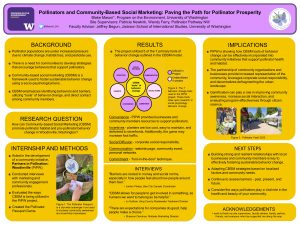POLLINATORS AND COMMUNITY-BASED SOCIAL MARKETING: PAVING A PATH FOR POLLINATOR PROSPERITY
Pollinators play a vital role in the health and stability of ecosystems around the world, and factors such as climate change, habitat degradation, and pesticide use are threatening them. As a result, certain communities are developing environmental programs that aim to address declining pollinator populations and dwindling habitat at the local level. An example of this can be seen in the work being done by Partners in Pollination: Woodinville, which is a community organized initiative that aims to rally community support around supporting pollinator health and habitat within the City of Woodinville, WA. While assisting in the development of the project, I evaluated the ways the initiative incorporates the primary methods of community based social marketing (CBSM) to overcome barriers associated with behavior change while simultaneously defragmenting the urban landscape. To accomplish this, I reviewed a variety of sources pertaining to CBSM, behavior change, and the use of games in order to assess how the Partners in Pollination: Woodinville initiative is utilizing effective behavior-changing techniques. To supplement my understanding, I conducted interviews with social marketing experts and program developers to gain insight regarding behavior-changing strategies. With this information, I found that the Partners in Pollination program successfully utilizes five of the seven tools of behavior change constituted in the CBSM framework, particularly social diffusion, incentives, and convenience. Additionally, my research and involvement in the project encouraged me to look into how gamification has potential positive implications for changing behavior, supporting pollinators, and participating in citizen science.
